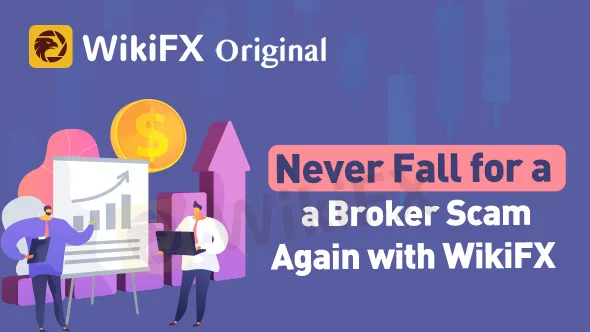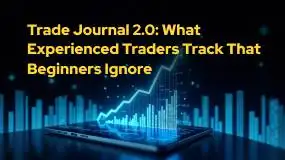简体中文
繁體中文
English
Pусский
日本語
ภาษาไทย
Tiếng Việt
Bahasa Indonesia
Español
हिन्दी
Filippiiniläinen
Français
Deutsch
Português
Türkçe
한국어
العربية
Never Fall for a Broker Scam Again with WikiFX
Abstract:Scammers are always on the lookout for vulnerable traders who are eager to make a quick profit, and they use various tactics to lure unsuspecting traders into their traps. In this article, we will discuss the mushrooming cases of forex broker scams and the severe consequences traders may face if they fall victim to these scams.

The forex market has become increasingly popular over the years, with more and more people venturing into trading. However, as the popularity of forex trading grows, so does the number of forex broker scams. Scammers are always on the lookout for vulnerable traders who are eager to make a quick profit, and they use various tactics to lure unsuspecting traders into their traps. In this article, we'll talk about the growing instances of forex broker scams and the serious repercussions that traders may experience if they fall for them.
Forex broker scams come in many forms, including fake brokers, Ponzi schemes, and unregulated brokers. These scams usually promise high returns with little or no risk, making them attractive to new and inexperienced traders. Unfortunately, these scams often lead to huge losses for traders, who may lose their entire investment or even their life savings. The scammers are experts at creating convincing websites and social media pages, which can make it challenging for traders to differentiate between legitimate brokers and scammers.
One of the severe consequences of falling for a forex broker scam is the loss of funds. Scammers are skilled at convincing traders to deposit large sums of money into their accounts, promising high returns in a short amount of time. Once the scammers have received the money, they disappear, leaving the traders with nothing. This can have devastating effects on a trader's financial stability and emotional wellbeing.
Another consequence of falling for a forex broker scam is damage to a trader's reputation. Scammers often collect personal information from their victims, including their names and addresses. They can use this information to carry out identity theft or other fraudulent activities, which can result in a loss of credibility and trust.
To avoid falling for a forex broker scam, traders need to do their due diligence and conduct thorough research on the broker they want to work with. This is where WikiFX comes in handy.

WikiFX is a comprehensive platform that provides traders with all the information they need to make informed decisions about their choice of broker. The platform features a global database of over 40,000 brokers, providing traders with detailed information on brokers' regulatory status, trading platforms, customer service, and trading conditions. WikiFX evaluates brokers based on these factors helping traders to compare and choose brokers that meet their trading needs.
The platform also provides a regulatory inquiry tool, which allows traders to check the regulatory status of a broker. By using this tool, traders can easily verify if a broker is regulated and licensed by a reputable regulatory body such as the FCA, ASIC, or CySEC. This ensures that traders' investments are safe and secure, and they are protected from fraudulent brokers.
In addition, WikiFX provides a blacklist of unregulated and scam brokers, helping traders to avoid falling for forex broker scams. The blacklist is updated regularly, and it includes information on brokers who have been found to engage in fraudulent activities such as manipulating prices, withholding funds, and providing false information.
Moreover, WikiFX features a rating system, which allows traders to rate brokers based on their experiences with them. Traders can provide feedback on brokers' trading conditions, customer service, and withdrawal processes, helping other traders to make informed decisions.
For instance, highly reputable and regulated forex brokers such as IG, Oanda, and Saxo Bank are listed on WikiFX as regulated brokers. These brokers are regulated by reputable regulatory bodies, including the FCA, ASIC, and CySEC, which ensures that traders' investments are safe and secure.



In conclusion, forex broker scams are a growing concern, and traders need to be cautious when choosing a broker to work with. By using WikiFX, traders can easily identify regulated, reliable, and suitable forex brokers for their trading needs, which ensures that they are protected from fraudulent brokers. Download the WikiFX free mobile application from App Store or Google Play, or visit wikifx.com today to start trading with confidence!

Disclaimer:
The views in this article only represent the author's personal views, and do not constitute investment advice on this platform. This platform does not guarantee the accuracy, completeness and timeliness of the information in the article, and will not be liable for any loss caused by the use of or reliance on the information in the article.
Related broker
Read more

Trade Journal 2.0: What Experienced Traders Track That Beginners Often Ignore
A Trading Journal is more than a basic record of trades. It’s a learning and improvement tool. Beginners often jot down only price and time. Experienced traders add deeper insight that helps them get better over time. Here's what they track:

Thailand-Cambodia War Pressures Thai Baht in Forex Market
The ongoing conflict between Thailand and Cambodia has put immense pressure on the Thai Baht, impacting the forex market and investor sentiment. Read on for more.

6 Red Flags to Notice Before Investing in Neuron Markets
Investment scams have been rising over the last 5–6 years. Therefore, you need to be alert in the forex market, as many scam brokers are active and waiting to exploit inexperienced investors and traders. Neuron Markets is one such broker that appears genuine and makes big promises but ends up swindling investors’ money. Checkout red Flags and stay Safe

Future of Forex in India: Growth or Global Domination?
Every Trader or Investor in India who wants to invest in the dynamic forex market must read this important article. It explores the future of the forex market in India and answers a common question: Forex market will rise or crash in India ? Checkout the article below.
WikiFX Broker
Latest News
Global week ahead: Crunch time for trade talks as Trump's deadline nears
Top Wall Street analysts recommend these dividend stocks for regular income
Stock futures rise as U.S.-EU trade deal kicks off a hectic week for markets: Live updates
Thailand-Cambodia War Pressures Thai Baht in Forex Market
Treasury yields tick lower as investors look ahead to Fed's interest rate decision
European stocks set to rise after the U.S. and EU strike trade agreement
Samsung Electronics signs $16.5 billion chip-supply contract; shares rise
Does XS.com Hold Leading Forex Regulatory Licenses?
Elon Musk confirms Tesla has signed a $16.5 billion chip contract with Samsung Electronics
Chile Bumps Up Copper Price Forecast and Flags Lagging Collahuasi Output
Currency Calculator


